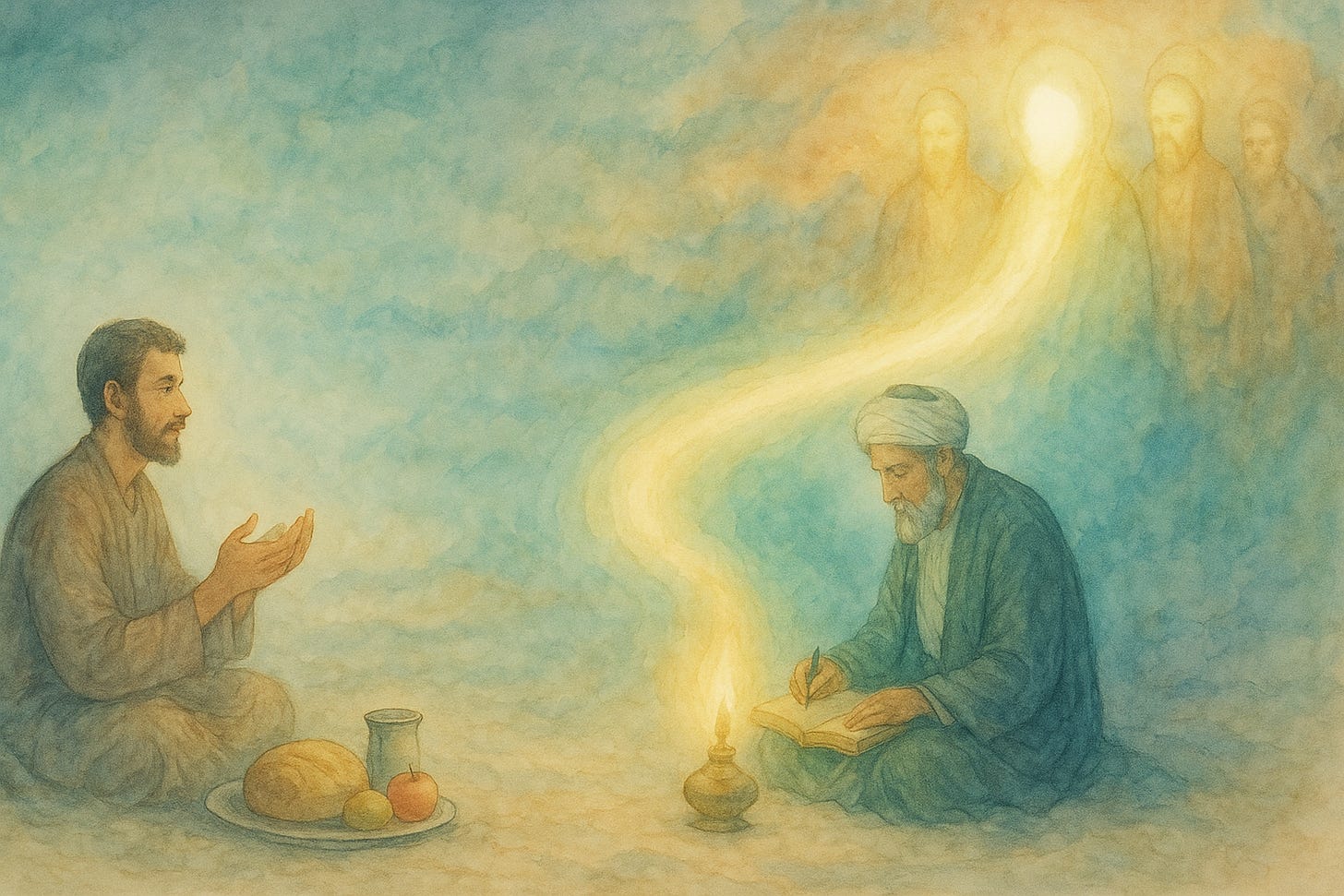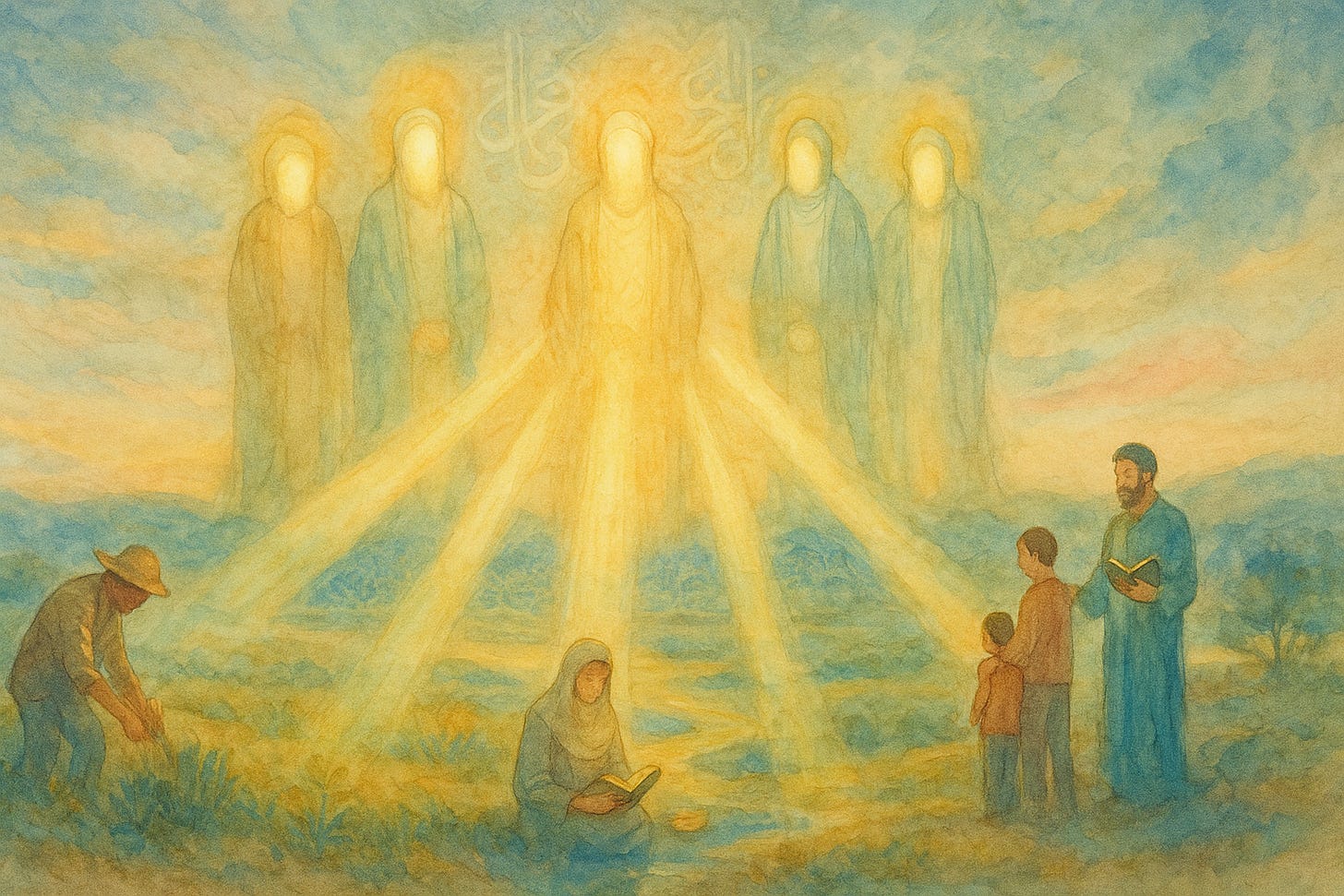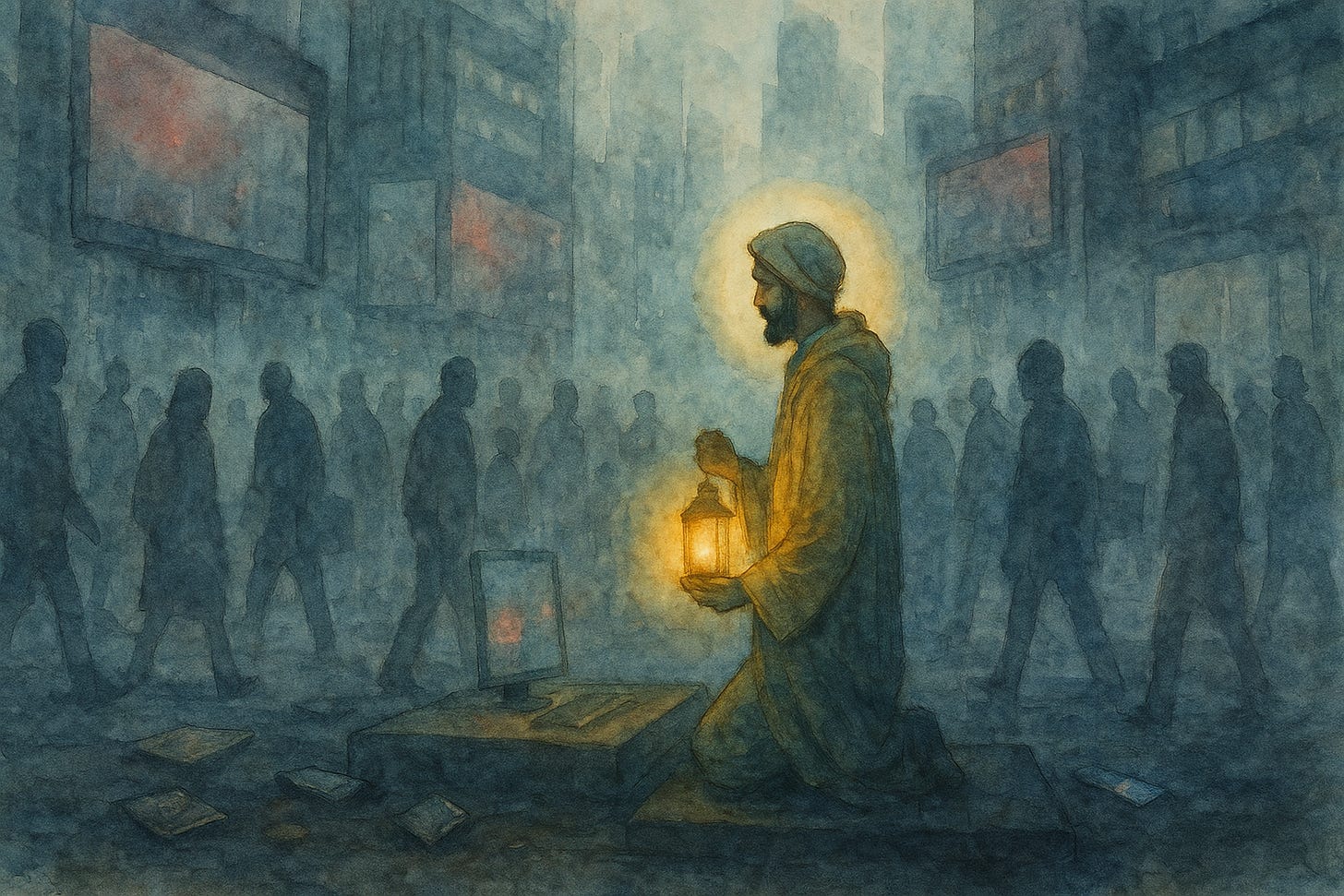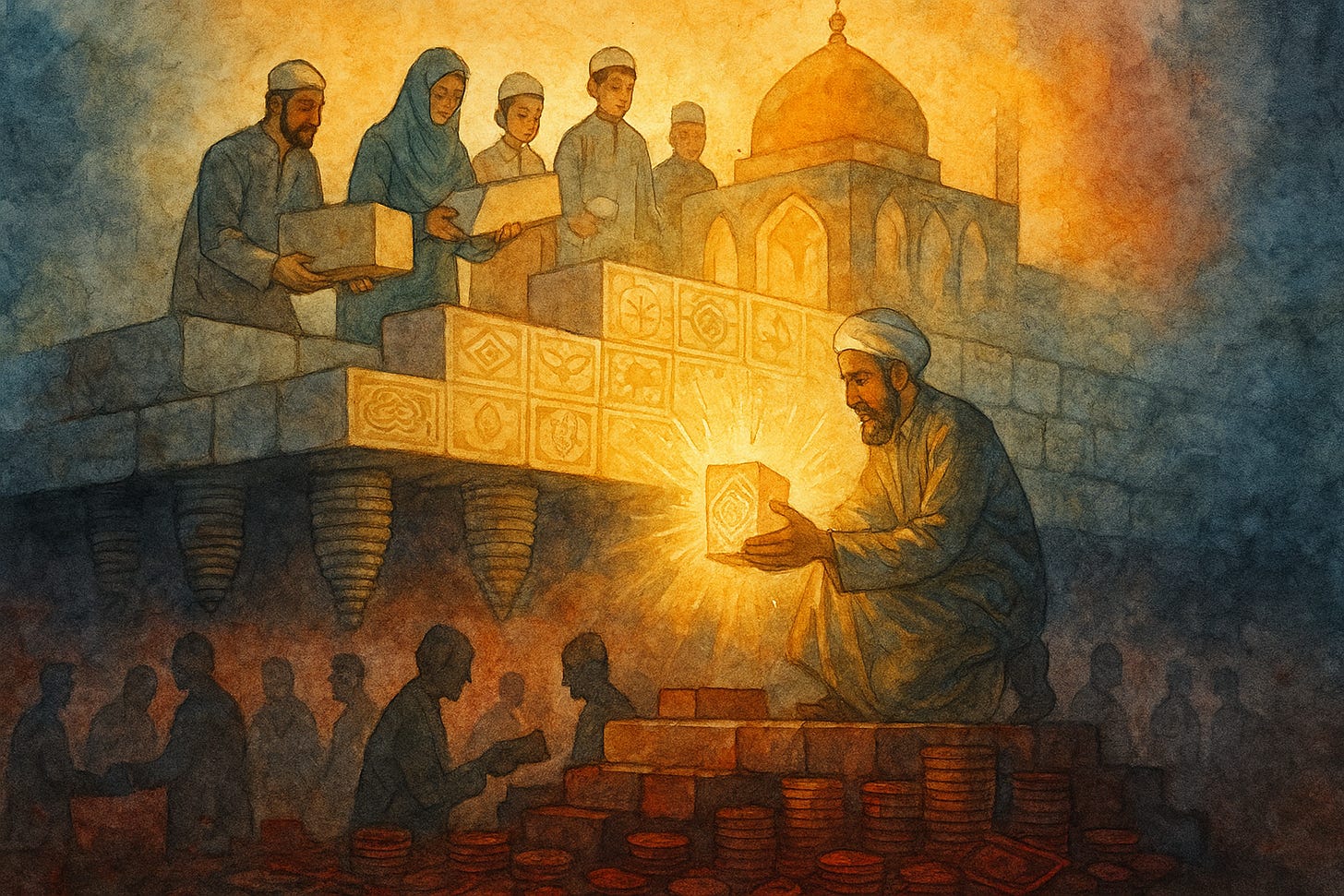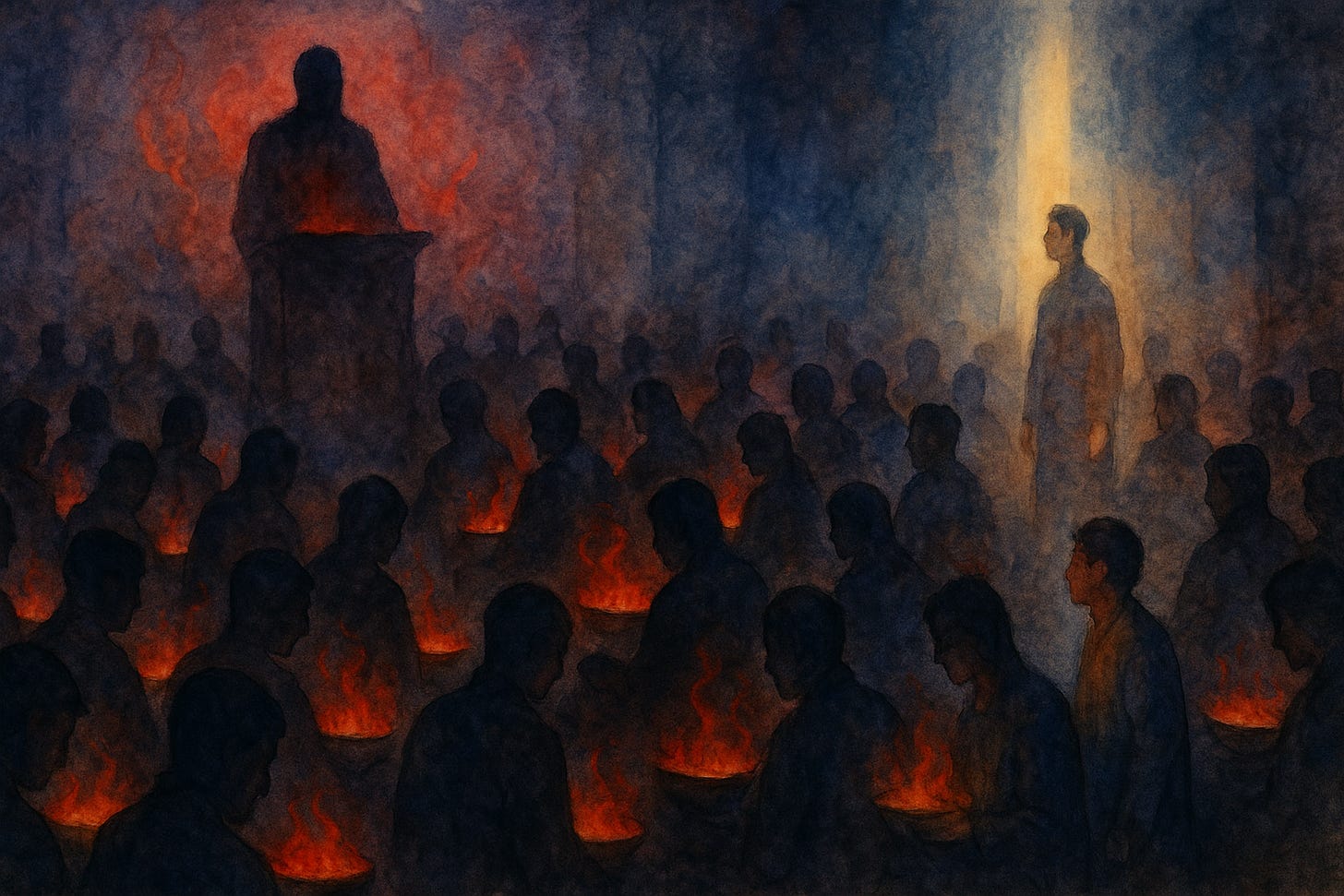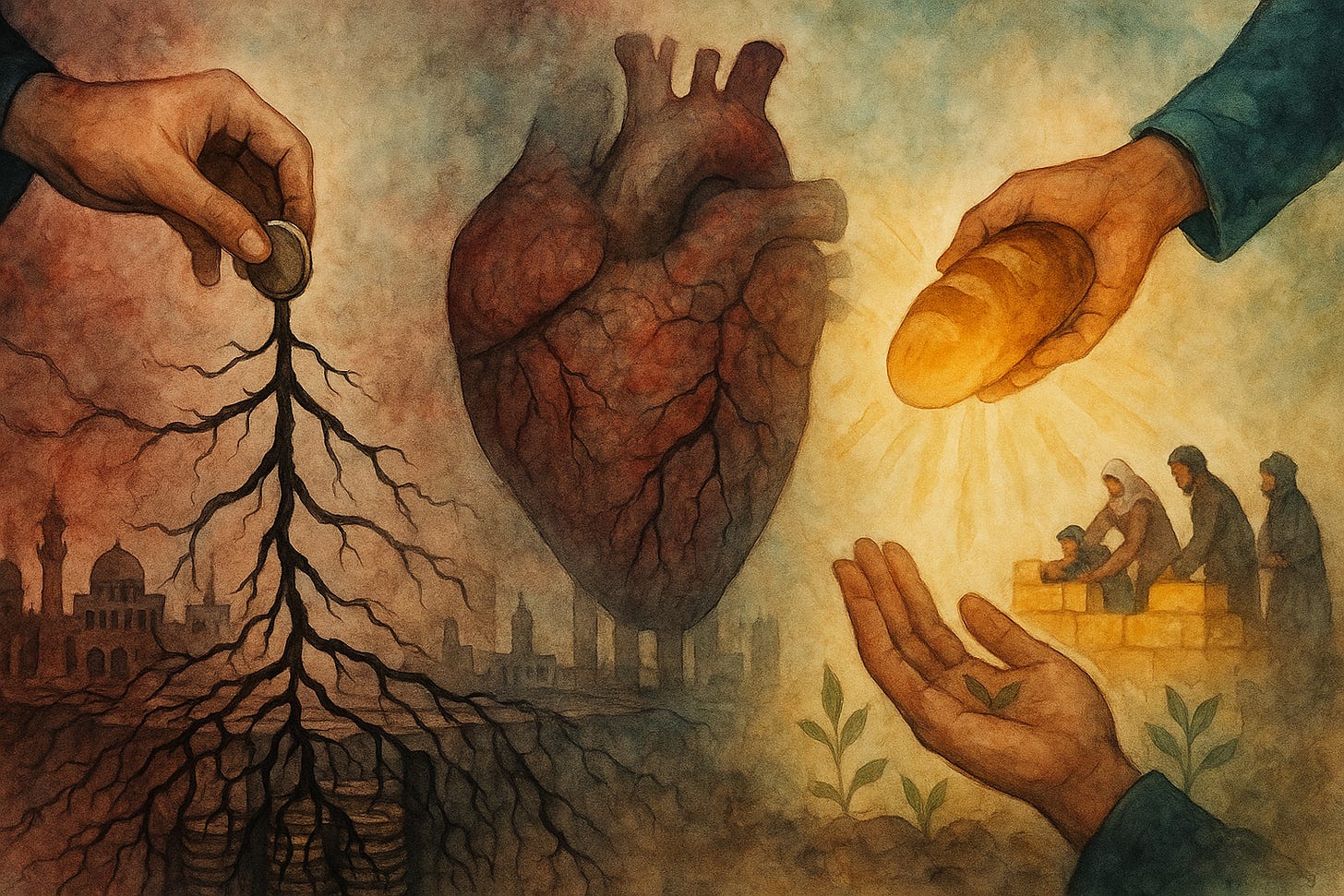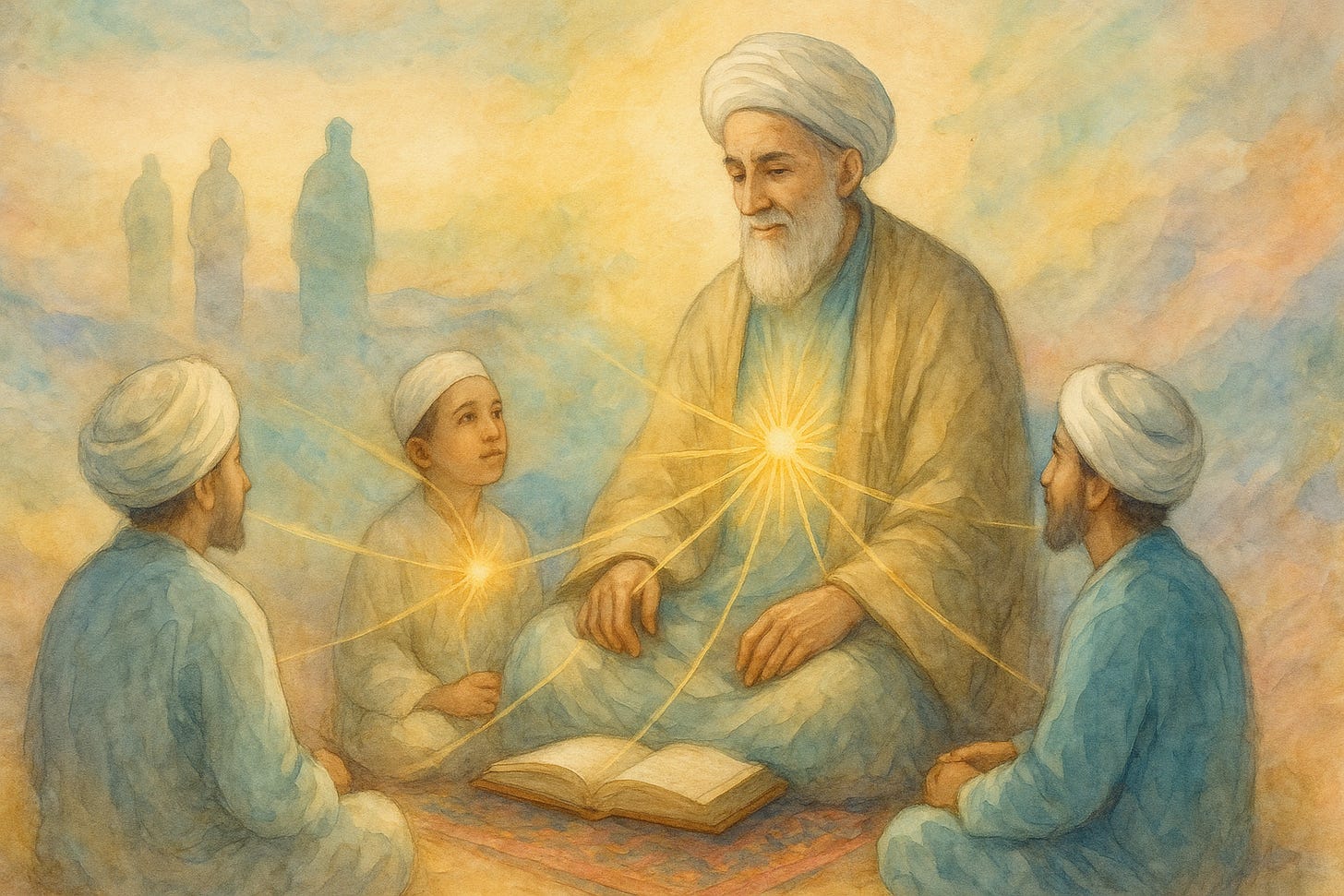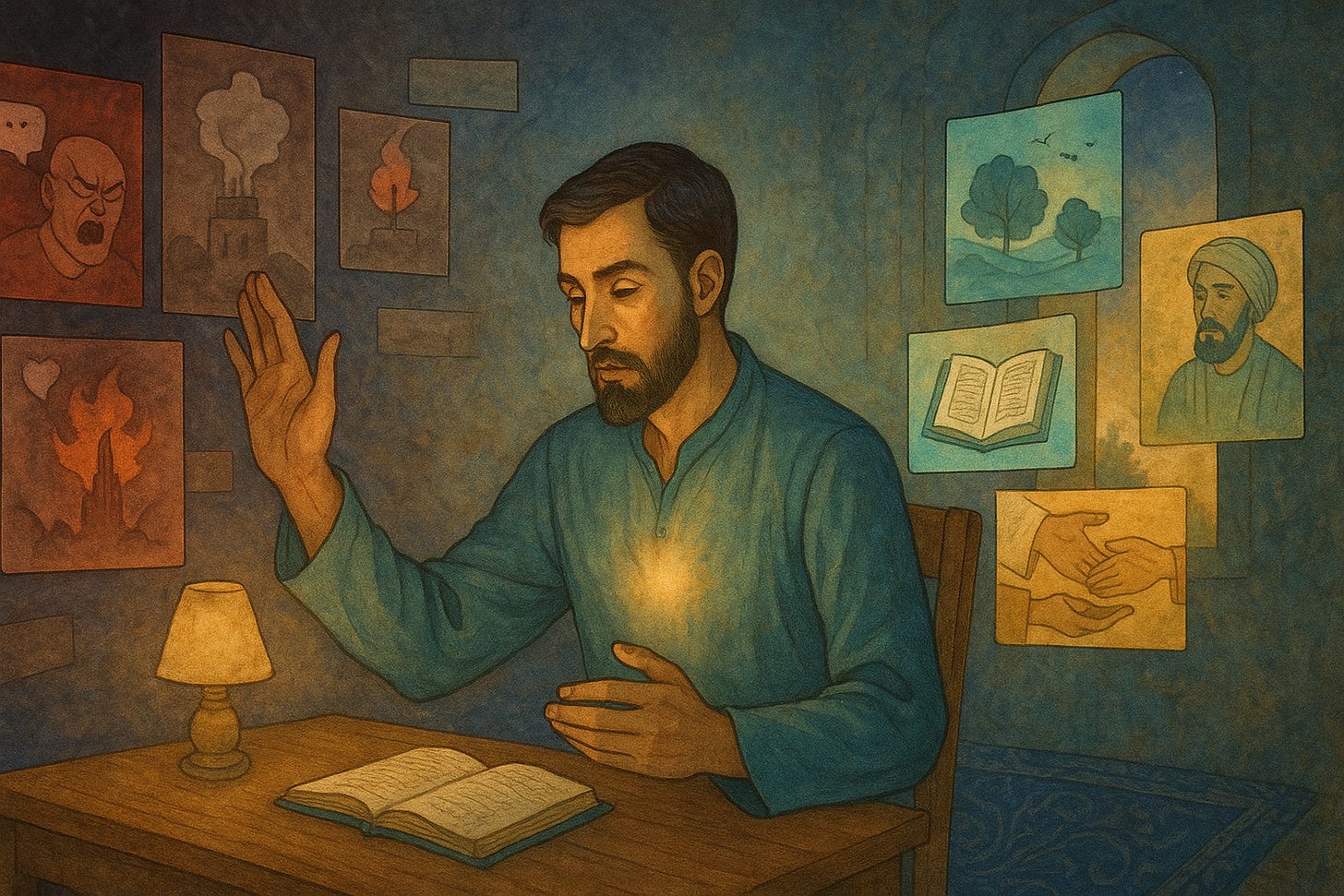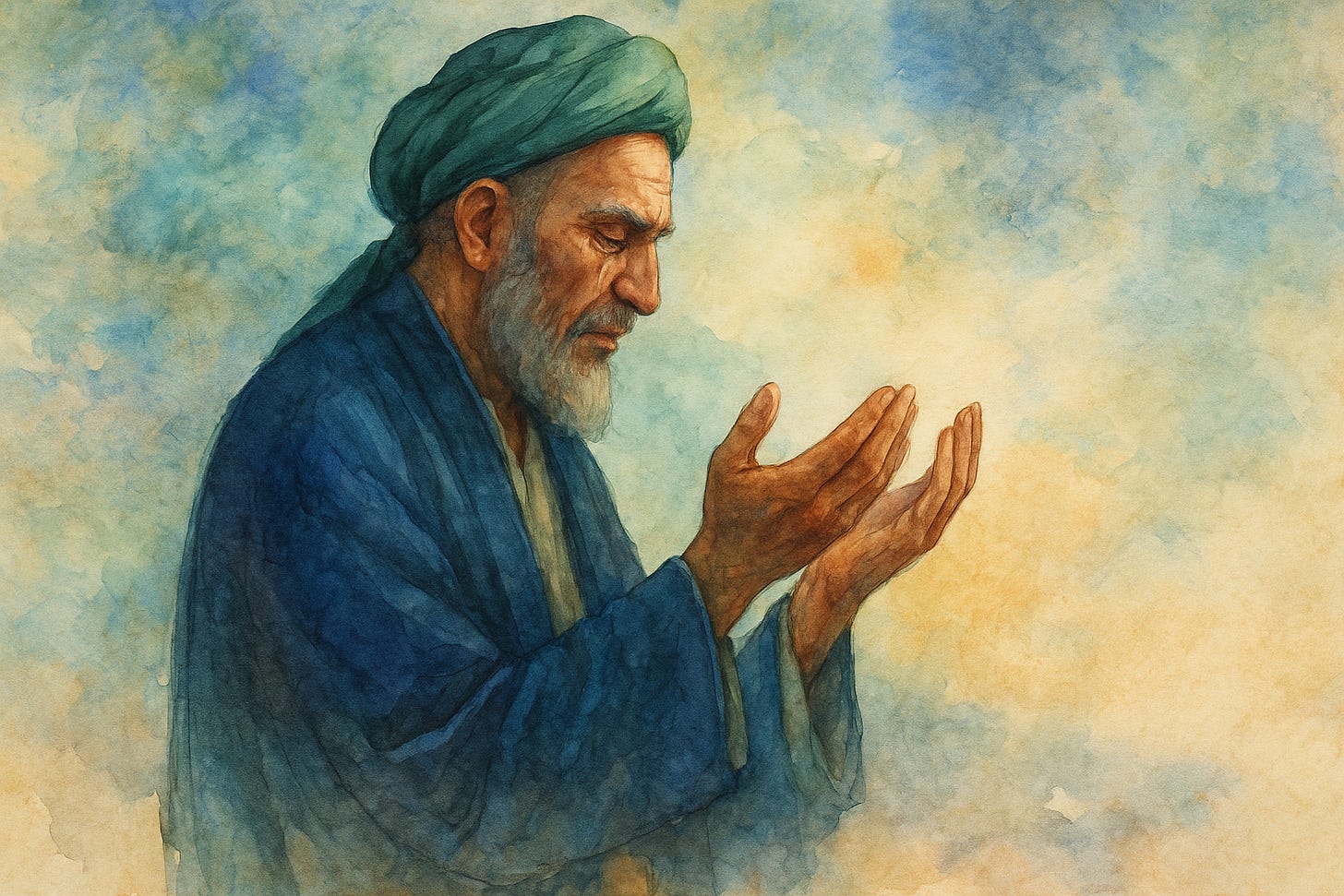[23] The Art of Supplication - The Heart of the Matter - Part 3 - The Fuel for the Heart (Rizq Halal)
A series of discussions based on the book Uddat al-Dai wa Najah as-Saee - The Provision of the Supplicant, and the Triumph of the Seeker by Ibn Fahd al-Hilli on the subject of Supplication and Prayer.
In His Name, the Most High
This is the twenty-third part of our series, The Art of Supplication, an ongoing exploration into the sacred relationship between the supplicant, the supplication, and the Divine.
The insights within this series are cumulative, and the nature of our discussion requires that each part build upon foundations laid in the ones that came before.
To prevent any misunderstanding and to fully benefit from the depth of this subject, it is essential that you engage with the previous parts in order before continuing with this one.
The previous parts in this series can be found here:
Video of the Majlis (Sermon/Lecture)
This write up is a companion to the video majlis (sermon/lecture) found below:
Audio of the Majlis (Sermon/Lecture)
This write up is a companion to the audio majlis (sermon/lecture) found below:
Recap
The Heart of the Matter: The Axis of Supplication (Yaqin)
In our second session of this sub-series — the Heart of the Matter — we moved from the foundation of Purity to the axis of supplication - certainty (yaqin)—the substance that fills the purified vessel of the heart.
Our exploration unfolded in three clear movements:
The Intellectual Foundation of Yaqin:
We first established that yaqin is not a blind, inherited dogma but a profound intellectual achievement. Following Imam Ali’s definition, we explored its “four pillars”: insightful discernment, the interpretation of wisdom, admonition born of reflection, and following the established way of those who came before.
Our Lesson: Our lesson was to graduate from this “faith of inheritance” to a “faith of investigation,” always seeking the guidance of a righteous scholar.
Our Call to Clarify: Our call was to reject the brittle, fearful dogma of the takfiri for the robust, confident, and intellectual certainty of the Ahl al-Bayt.
The Internal State of Yaqin:
Next, we explored what yaqin feels like. We learned from Imam al-Sadiq that it is “faith in its entirety.” Following Imam Khomeini, we understood it as a state of vision, the fruit of polishing the heart with dhikr (remembrance), where unseen realities become “brighter than the sun.” This culminated in Ayatullah Fadhlullah’s profound insight that yaqin transforms dua’ (supplication) from a “request to a dialogue.”
Our Lesson: Our lesson was to use dhikr not as a tally, but as the act of “polishing the heart’s mirror” to resist the modern “age of heedlessness” (ghafla).
Our Call to Clarify: Our call was to proclaim that dhikr and the yaqin that results from it, are radical acts of resistance.
Yaqin as the Weapon of Resistance:
Finally, we witnessed yaqin in action under pressure. We learned from Imam al-Sajjad in Dua’ Abu Hamzah al-Thumali that our certainty is not in our deeds but in God’s Mercy. We identified Satan’s primary tactic—using our sins to make us despair (Imam Khomeini)—and the “weapon” to defeat it: the hadith from Imam al-Sadiq that God’s mercy erases the sin from the memory of the angels and the earth. This linked directly to Surah al-Asr, where yaqin is the engine of sabr (steadfastness), embodied in the contemporary quotes of Sayyid Hasan Nasrallah (”inevitable destiny”) and Hajj Qasem Soleimani (”fed by certainty, not by salary”).
Our Lesson: Our lesson was that certainty is in mercy, not in deeds. This was a practical lesson that gave us ammunition in dealing with the incessant and insidious whispers of Satan. We called to cultivate a certainty that is based on His attributes and not our states.
Our Call to Clarify: Our call was that in a world of geopolitics , oppress and war, the primary weapon of the oppressor is not the bomb or the missile; it is despair. That from the teachings of Quran, and the leaders, we must understand and clarify that sabr (steadfastness, forbearance, patience, resistance) is not a grim and passive endurance. Rather it is a joyful, offensive and confident resistance, that is born of an unshakable yaqin.
We concluded with our supplication, “A Whisper for the Light of Certainty,” ready to explore the final prerequisite that fuels this entire spiritual state.
In His most beautiful name, we proceed …
The Heart of the Matter - Part 3 - The Fuel for the Heart (Rizq Halal)
In our journey through “The Heart of the Matter,” we have laid the essential foundations for a supplication that can ascend to the Divine.
In the first part, we began with the prerequisites of purity (tazkiyah) and humility (khushu’). We learned that the “garments” we must purify are not just our clothes, but our very self (nafs). We discovered that this purity is validated only by a pure heart (qalb tahir), and that this state of humility is the natural result of realising our own ontological poverty (faqr).
We understood, in essence, how to purify the vessel.
In the second part, we filled that pure vessel with the light of certainty (yaqin). We learned that yaqin is not a blind, inherited dogma, but a profound intellectual achievement built on “four pillars,” as defined by Imam Ali (peace and blessings be upon him).
We saw how this certainty, born of dhikr (remembrance), transforms our prayer from a “request to a dialogue,” and how it becomes the unshakeable axis of our soul and the proactive weapon of our resistance against both inner despair and outer tyranny.
But a pure vessel and a bright light are not static achievements.
They are living states that must be actively sustained, day after day, moment after moment.
A polished mirror can be re-tarnished.
A burning light can be dimmed.
This brings us to the third and final prerequisite of our series, the “Heart of the Matter.”
It is the most practical, the most immediate, and perhaps the most challenging of all.
We must now discuss the fuel for the heart.
This fuel is Rizq Halal—Lawful and Pure Sustenance.
In this session, we will discover that rizq (sustenance) is one of the most profound and misunderstood concepts in our religion.
We will expand our definition of it far beyond the plate of food on our table.
We will find that our rizq is everything we consume: the food we eat, the money we earn, the images we see, the words we hear, and most critically, the knowledge we take and the leadership we follow.
This is the part of our journey where our inner purity (part one) and our inner certainty (part two) are put to the ultimate test.
It is where our “Heart of the Matter” meets the world.
The Spectrum of Sustenance: From Morsels to Imams
The Core Concept: Redefining Rizq
We begin by shattering the limited definition of rizq.
In the Qur’an, the command for pure sustenance is foundational, and it is almost always linked to righteous action. In a key verse addressed to all Messengers, God sets the divine formula:
يَا أَيُّهَا الرُّسُلُ كُلُوا مِنَ الطَّيِّ
O messengers, eat of the good/pure things and act righteously (act with integrity) ...
— Qur’an, Surah al-Mu’minun (the Chapter of the Believers) #23, Verse 51
The “rabbit hole” is the order of the command.
The command to “eat of al-tayyibat” (the good, pure, lawful things) comes before the command to “act righteously.”
This precedence is not accidental.
Allamah Tabatabai, in Tafsir al-Mizan, explains this direct causal link:
وَفِي تَقْدِيمِ الْأَكْلِ مِنَ الطَّيِّبَاتِ عَلَى الْعَمَلِ الصَّالِحِ إِشَارَةٌ إِلَى أَنَّ صَلَاحَ الْعَمَلِ مُتَوَقِّفٌ عَلَى التَّغَذِّي بِالطَّيِّبِ، فَإِنَّ الْغِذَاءَ يُؤَثِّرُ فِي نَفْسِ الإِنْسَانِ أَثَرًا ظَاهِرًا، وَيُهَيِّئُهَا لِمَا يُنَاسِبُهُ مِنَ الأَعْمَالِ.
“And in the precedence of ‘eating of the good/pure things’ over ‘righteous action’, there is an indication (ishara) that righteous action is dependent upon being nourished by the tayyibat (the good/pure things).
For food exerts a manifest effect on the human soul and predisposes it toward works that correspond to its nature.”
— Allamah Tabatabai, Tafsir al-Mizan, commentary on Surah al-Mu’minun (the Chapter of the Believers) #23, Verse 51
This is why the Quran repeatedly pairs eating with righteousness - not as separate commands but as cause and effect.
What enters us becomes us.
The one who consumes oppression becomes an oppressor; the one who consumes mercy becomes merciful.
A corrupt intake cannot produce a pure outcome.
But what is this “intake”?
What are these al-tayyibat?
Our definition of rizq (sustenance) must be expanded.
Allamah Tabatabai, in his commentary on the verse:
وَتَرْزُقُ مَن تَشَاءُ بِغَيْرِ حِسَابٍ
“You give sustenance (tarzuqu) to whom You will without account”
— Qur’an, Surah Aal-i-Imran (the Chapter of the Family of Imran) #3, Verse 27
This verse clarifies that rizq is any bestowal from God, not just food.
Allamah writes:
وَالرِّزْقُ أَعَمُّ مِنَ المَادِّيِّ كَالطَّعَامِ وَالشَّرَابِ وَاللِّبَاسِ وَالمَسْكَنِ وَغَيْرِ المَادِّيِّ كَالْعِلْمِ وَالهِدَايَةِ وَالمَعَارِفِ الحَقَّةِ، فَكُلُّ ذَلِكَ رِزْقٌ مِنَ اللَّهِ سُبْحَانَهُ يُقَدِّرُهُ لِمَنْ يَشَاءُ وَيَمْنَعُهُ عَمَّنْ يَشَاءُ.
“And rizq (sustenance) is more general (a’amm) than the material—such as food, drink, and clothing... and the non-material—such as knowledge (al-’ilm), guidance (al-hidaya), and true gnosis (al-ma’arif al-haqqa).
All of that is provision from God, exalted is He, which He allots to whom He wills and withholds from whom He wills.”
— Allamah Tabatabai, Tafsir al-Mizan, commentary on Surah Aal-i-Imran (the Chapter of the Family of Imran) #3, Verse 27
Therefore, al-tayyibat are all pure provisions, whether they are physical (pure food) or intellectual (pure knowledge).
The Ahl al-Bayt made this explicit.
They provided the ultimate interpretation of “sustenance” in a hadith that reframes our entire understanding of knowledge.
When Imam Ja’far al-Sadiq was asked about the verse:
فَلْيَنظُرِ الْإِنسَانُ إِلَىٰ طَعَامِهِ
Let man look at his food
— Qur’an, Surah Abasa (the Chapter of the one who Frowned) #80, Verse 24
The narrator asked:
قال: قُلتُ: فَمَا طَعَامُهُ؟
قال: عِلْمُهُ الَّذِي يَأخُذُهُ، وَمِمَّن يَأخُذُهُ.“I (the narrator) asked, ‘What is his food?’ He (the Imam) replied: ‘His knowledge, which he takes, and from whom he takes it.’”
— Al-Kulayni, Al-Kafi, Volume 1, Page 49, Hadith 7
This is our foundation.
Rizq is a spectrum.
At one end, there is physical sustenance (food and wealth).
At the other, there is intellectual and spiritual sustenance (knowledge and mentors).
And just as there are two kinds of sustenance, the Qur’an teaches us that there are two ultimate sources for that sustenance.
These are the “Imams” we choose to follow.
The Rizq Halal Source
The Qur’an in Surah al-Sajdah (the Chapter of the Prostration) explains how divine leadership is created:
وَجَعَلْنَا مِنْهُمْ أَئِمَّةً يَهْدُونَ بِأَمْرِنَا لَمَّا صَبَرُوا ۖ وَكَانُوا بِآيَاتِنَا يُوقِنُونَ
“And We made from among them leaders (imams) who guide (yahduna) by Our command, when they were steadfast (sabaru) and had certainty (yuqinun) in Our signs.”
— Qur’an, Surah As-Sajdah (the Chapter of the Prostration) #32, Verse 24
Notice the prerequisites: Sabr (Steadfastness) and Yaqin (Certainty, our topic from Part 2).
These are the “Imams of Guidance.
The Rizq Haram Source
Again, in Quran, Surah al-Qasas (the Chapter of the Narrations) shows us the opposite:
وَجَعَلْنَاهُمْ أَئِمَّةً يَدْعُونَ إِلَى النَّارِ ۖ وَيَوْمِ الْقِيَامَةِ لَا يُنصَرُونَ
“And We made them leaders (imams) who invite (yad’una) to the Fire; and on the Day of Resurrection, they will not be helped.”
— Qur’an, Surah al-Qasas (the Chapter of the Narrations) #28, Verse 41
This is the synthesis.
The most critical choice we make is not just what we eat, but which leader (Imam) we take our sustenance from.
Every day, we are consuming either guidance or fire.
The Inward Lesson: Auditing Our Total Consumption
The practical lesson from this is that we must become meticulous “auditors” of all our consumption.
We must apply the “poison” analogy: just as haram (unlawful) food makes the body sick, haram ideas make the soul sick.
What we consume becomes us.
Our audit must have two parts:
Auditing our Physical & Financial Sustenance
We must ask:
“Is my physical sustenance tayyib?”
This is not just about a halal stamp on meat.
It is about the source of the wealth that bought it.
As the great jurists, like Ayatullah Sistani, guide us in his legal edicts, a transaction becomes haram (unlawful) not just from the item (like pork), but from the method.
His rulings forbid numerous types of transactions which include, but are not limited to:
كَالْغِشِّ... وَتَطْفِيفِ الْمِكْيَالِ وَالْمِيزَانِ... وَأُجْرَةِ الْعَمَلِ الَّذِي لَا يَسْتَوْفِيهِ... وَالظُّلْمِ كَالْغَصْبِ
“Such as deception/fraud (al-ghish)... and giving short measure in scales (tatfif al-mikyal)... and taking wages for a job one does not fulfil (ujrat al-’amal alladhi la yastawfihi)... and oppression (al-dhulm) such as usurpation (al-ghasb).”
— Ayatullah Sistani, Minhaj al-Salihin, Book of Transactions, sections on al-Makasib al-Muharrama (Unlawful Transactions)
This is precisely what is meant by “oppression, deception, and negligence in the rights of others.”
We must ask:
“Is my salary truly halal? Am I giving a full day’s work for my pay (not committing ujrat al-’amal alladhi la yastawfihi)?
Is my business practise just (not committing fraud (al-ghish) or oppression (al-dhulm)?
Am I exploiting anyone in my supply chain?”
When we scroll through social media, are we ‘eating’ from accounts that increase our yaqin or our anxiety?
When we binge-watch, are we consuming content that makes us more human or more numb?
This is the modern battlefield of rizq - not just what enters our mouth but what enters our consciousness through our screens.
Auditing our Intellectual & Spiritual Sustenance
This is the more dangerous, modern-day poison.
We must ask:
“Is the ‘food’ I consume from my screen tayyib?”
Is the media I watch planting seeds of despair and ghafla (heedlessness), or is it planting yaqin (certainty)?
Is the scholar I follow an “Imam of Guidance” leading me to humility, or an “Imam of Fire” leading me to arrogance (’ujb) and division?
We must also reframe “gluttony.”
It is not just the over-eating of food.
It is the mindless over-consumption of all things—toxic social media, useless news, the endless pursuit of wealth—all of which are forms of rizq haram that poison the heart.
The Outward Call: Challenging the Normalisation of Poison
The modern world has normalised both kinds of poisonous sustenance.
It completely separates our economic life and our intellectual life from our spiritual life.
The Financial Poison
Our “Call to Clarify” is to reject the normalisation of a “billionaire” co-existing with a starving neighbour.
This is a society built on rizq haram.
We must challenge the hypocrisy, connecting it back to the first part of this series: a community that builds its mosque or religious centre with riba (interest-based) money or funds from known exploitation has a “pure garment” on a filthy foundation.
Here, we must be precise.
We live in a world where the entire global economic system is ‘interest-laden.’
Our great jurists, from Ayatullah Sistani to Imam Khamenei, have issued rulings that permit certain interactions (like mortgages for a home) under the specific conditions of idtirar (compulsion or necessity), as a way to navigate this reality.
Here, we must be precise. We live in a world where the entire global economic system is, as you said, ‘interest-laden.’ Our great jurists, from Ayatullah Sistani to Imam Khamenei, have issued rulings that permit certain interactions (like mortgages for a home) under the specific conditions of idtirar (compulsion or necessity), as a way to navigate this reality.
For example, when Ayatullah Sistani (may God preserve him) is asked about taking loans from non-Muslim banks, his ruling clarifies a specific legal channel:
يجوز أخذ القرض من البنك الكافر، أهلياً كان أم غيره، لا بقصد الاقتراض، بل بقصد الاستيلاء على المال المجهول المالك، بإذن الحاكم الشرعي
“It is permissible to take a loan from a non-Muslim (kafir) bank, whether private or otherwise, not with the intention of ‘borrowing’ (iqtirad), but with the intention of ‘taking possession’ (al-istila’) of ‘property of an unknown owner’ (al-mal al-majhul al-malik), with the permission of the Religious Ruler.”
— Ayatullah Sistani, Minhaj al-Salihin, Volume 2, Issue 830
Similarly, Imam Khamenei (may God preserve him), when asked about this issue, frames it through the lens of darurah (necessity):
سؤال: آیا گرفتن وام مسکن که دارای ربا میباشد در خارج از کشور جایز است؟
جواب: گرفتن وام ربوى جايز نيست؛ مگر آن كه... يا ضرورت اقتضا كند
Question: “Is it permissible to take a housing loan that contains riba in a foreign country?”
A: “Taking an interest-based loan is not permissible; unless... necessity dictates it (darurat iqtida kunad).”
— Imam Khamenei, Ajwibat al-Istifta’at (Answers to Inquiries), Q&A 1916
But this permission must be understood in its true spiritual context.
It is a concession born of our weakness, not an endorsement of the system.
It is the spiritual equivalent of being permitted to eat maytah (carrion) to avoid starvation.
You do it to survive, but you feel the impurity of it, and you strive with all your might to find halal food.
To become complacent with this permission—to see it as a “green light” to build our sacred spaces without a second thought—is a spiritual failure.
It is a failure of yaqin, a failure to trust in God’s barakah (blessing).
Therefore, this “permission of necessity” must not be an end to the discussion, but the beginning of our creative struggle.
It must be the impetus that forces us to be, more imaginative.
God has given us the rizq of imagination to find solutions to the rizq haram we are forced into.
This is the true jihad (struggle) of the community: to pioneer our own systems that mitigate this reliance, such as reviving the sunnah of direct community-funding (waqf), exploring community-based credit unions, and researching new, decentralised financial models that are free from the poison of riba.
This is the very definition of sabr—not a passive waiting, but an active, creative struggle to enjoin the truth.
This is why the resistance movements’ economic creativity - from Yemen’s self-sufficiency despite blockade, to Gaza’s tunnel economy to Iran’s sanctions-resistance - isn’t just political strategy.
It’s spiritual jihad against the poisonous global system.
These communities prove that barakah can sustain where abundance has been cut off.
The Intellectual Poison
We must also challenge the “Imams of Fire” in our midst.
When a community invites a speaker, online or in person, who preaches takfir (declaring others to be infidels), who is unqualified, who lies and distorts Islamic concepts, exhibits arrogance, and/or promotes division, that community is knowingly feeding its people spiritual poison.
This is just as dangerous, if not more so, than serving impure food at a gathering.
But the most dangerous “Imams of Fire” are not just rogue speakers; they are the leaders of nations. The Qur’an also warns of the “Imams of Disbelief”:
وَإِن نَّكَثُوا أَيْمَانَهُم مِّن بَعْدِ عَهْدِهِمْ وَطَعَنُوا فِي دِينِكُمْ فَقَاتِلُوا أَئِمَّةَ الْكُفْرِ ۙ إِنَّهُمْ لَا أَيْمَانَ لَهُمْ لَعَلَّهُمْ يَنتَهُونَ
But if they violate their oaths after their pledge, and attack your religion, then fight the imams (leaders) of disbelief—they have no faith—so that they may desist.
— Quran, Surah al-Tawbah (the Chapter of the Repentance) #9, Verse 12
This is not ancient history.
This is our daily geopolitical reality.
A leader who enables or commits genocide, who starves an entire population, or who builds his political power on systemic lies, is a modern “Imam of the Fire.”
The media outlets and state-sponsored propaganda machines that whitewash his crimes are distributing his poisonous rizq on a massive scale.
They are force-feeding the nafs (souls) of their population with falsehood, arrogance, and the dehumanisation of others.
This is the terrifying synthesis.
When a population passively consumes this propaganda, when they “just follow” their genocidal leader out of nationalism, apathy, or fear, they become complicit in his evil.
They are sustaining themselves on rizq haram.
Their tax money, their silence, their vote—it all becomes “food from the Fire.”
Our synthesis is this:
A “halal” label on our food is a spiritual deception if the money that bought it was haram, or if the ideology we consume while eating it is haram.
We must purify the entire chain.
The Anatomy of Corruption: The Blocked Heart & Riba
The Core Concept: The Spiritual Consequence
In our first point, we established that rizq haram (unlawful sustenance) is not just a disobedient act—it is the consumption of poison.
That poison, whether it is an impure morsel or an impure idea from an “Imam of Fire,” has a direct, tangible, and devastating spiritual consequence.
It is not just a “sin” we commit; it is a corrupting agent that we absorb until it becomes part of us, actively blocking our connection to the Divine.
The Prophet Muhammad (peace and blessings be upon him and his family) gave us the most terrifying warning about this.
He described a man on a long journey, dishevelled and covered in dust, who raises his hands to the sky, crying
“O Lord! O Lord!”
—the perfect picture of a desperate supplicant. And yet, the Prophet states, his plea is doomed.
Why?
عَنْ أَبِي هُرَيْرَةَ قَالَ: قَالَ رَسُولُ اللَّهِ :
«يَا أَيُّهَا النَّاسُ، إِنَّ اللَّهَ طَيِّبٌ لَا يَقْبَلُ إِلَّا طَيِّبًا، وَإِنَّ اللَّهَ أَمَرَ الْمُؤْمِنِينَ بِمَا أَمَرَ بِهِ الْمُرْسَلِينَ، فَقَالَ: ﴿يَا أَيُّهَا الرُّسُلُ كُلُوا مِنَ الطَّيِّبَاتِ وَاعْمَلُوا صَالِحًا﴾، وَقَالَ: ﴿يَا أَيُّهَا الَّذِينَ آمَنُوا كُلُوا مِنْ طَيِّبَاتِ مَا رَزَقْنَاكُمْ﴾.
ثُمَّ ذَكَرَ الرَّجُلَ يُطِيلُ السَّفَرَ، أَشْعَثَ أَغْبَرَ، يَمُدُّ يَدَيْهِ إِلَى السَّمَاءِ: يَا رَبِّ، يَا رَبِّ، وَمَطْعَمُهُ حَرَامٌ، وَمَشْرَبُهُ حَرَامٌ، وَمَلْبَسُهُ حَرَامٌ، وَغُذِّيَ بِالْحَرَامِ، فَأَنَّى يُسْتَجَابُ لِذَلِكَ؟»The Messenger of God said:
“O people, God is pure and accepts only what is pure. And indeed God has commanded the believers with what He commanded the messengers, saying: ‘O Messengers! Eat of the good things and act righteously’ and saying: ‘O you who believe! Eat of the good things We have provided for you.’
Then he mentioned a man who, having journeyed long, dishevelled and dusty, stretches his hands to the sky (saying): ‘O Lord! O Lord!’ — yet his food is unlawful, his drink is unlawful, his clothing is unlawful, and he has been nourished with the unlawful. So how can he be answered?”— Al-Nishaburi, Sahih Muslim, Book 12, Hadith 1015
— Al-Majlisi, Bihar al-Anwar, vol. 90, p. 373
The key word here, as found in our traditions, is ghudhdhiya—he was nourished by it.
The haram was not a single mistake; it has become his “flesh and blood.”
It is a contamination of the vessel itself.
A heart that is (as we learned in the first part) meant to be pure (tahir) is now physically corrupted by this fuel.
This is why the Imams warned that a single morsel of haram has a specific, corrosive effect on our worship.
It is said of Imam al-Sadiq:
مَنْ أَكَلَ لُقْمَةً مِنْ حَرَامٍ لَمْ تُقْبَلْ لَهُ صَلَاةٌ أَرْبَعِينَ لَيْلَةً، وَلَا تُسْتَجَابُ لَهُ دَعْوَةٌ أَرْبَعِينَ يَوْمًا، وَكُلُّ لَحْمٍ نَبَتَ مِنَ الْحَرَامِ فَالنَّارُ أَوْلَى بِهِ.
Whoever eats a single morsel of the unlawful, no prayer will be accepted from him for forty nights, and no supplication will be answered for forty days.
And every flesh that has grown from the unlawful — the Fire is more deserving of it.— Al-Majlisi, Bihar al-Anwar, Volume 63, Page 314
— Al-Nuri, Mustadrak al-Wasa’il, Volume 1, Page 151
This is not an arbitrary punishment.
It is a spiritual law.
It is the “spiritual half-life” of a poison.
It takes that long for the soul to process and purge the deep contamination caused by that single act of consumption.
The great jurist and gnostic, Ayatullah al-Khui, articulated this principle perfectly.
He explained that impure sustenance directly extinguishes the light of the intellect and the heart:
إِنَّ نُورَ الْعِلْمِ يُطْفَأُ بِالذُّنُوبِ وَاللُّقَمِ الْحَرَامِ
“Indeed, the light of understanding (nur al−fahm) is extinguished by unlawful morsels (al−luqam al−haram).”
— A foundational principle from Ayatullah al-Khui’s ethical lectures, widely attributed and cited by his students, e.g., in Sirat-e Saliheen, also cited by Ayatullah Jawadi-Amoli and Ayatullah Bahjat, and cited in Misbah al-Sharia (the Lantern of the Path) attributed to Imam Ja’far al-Sadiq
This is the spiritual equation: you cannot purify your heart and build certainty if you are ingesting impurity.
The rizq haram extinguishes the yaqin.
The Inward Lesson: The Poison of Riba (Usury)
If rizq haram in general is a poison, our “Inward Lesson” must be to dissect and understand its most potent, concentrated, and spiritually corrosive form: riba (usury, or interest).
The Qur’an does not treat riba as just another sin among many.
It is the only sin in the entire Qur’an that is singled out as a direct and explicit declaration of war against God and His Prophet:
...فَإِن لَّمْ تَفْعَلُوا فَأْذَنُوا بِحَرْبٍ مِّنَ اللَّهِ وَرَسُولِهِ...
“...And if you do not (desist from usury), then be notified of a war from God and His Messenger...”
— Qur’an, Surah al-Baqarah (the Chapter of the Cow) #2, Verse 279
This should shake us to our core.
We must ask: why?
Why is this financial transaction, which the modern world considers normal, treated with a severity greater than almost any other sin?
The Ahl al-Bayt explained that its severity is due to its profound spiritual impact.
It is not a sin of passion or a momentary lapse; it is a cold, calculated, and systematic corruption of the soul.
Imam Ja’far al-Sadiq gave us a terrifying scale to understand its true weight:
دِرْهَمٌ مِنْ رِبًا أَعْظَمُ عِنْدَ اللَّهِ مِنْ سَبْعِينَ زِنْيَةً كُلُّهَا بِذَاتِ مَحْرَمٍ فِي بَيْتِ اللَّهِ الْحَرَامِ
“A single dirham (coin) of riba (usury) is worse in the sight of God than seventy fornications, all of them with one’s own mother, in the sacred house of God (the Ka’bah).”
— Al-Kulayni, Al-Kafi, Volume 5, Page 144, Hadith 1
This shocking, visceral analogy is meant to awaken us.
As scholars like Imam Khomeini have explained, this is because riba is the antithesis of charity (sadaqah).
In his gnostic commentary, he explains that riba is not just a flawed transaction; it is a spiritual state rooted in a deep attachment to the world, which is the very opposite of the detachment and empathy required for charity.
He identifies this attachment as the root of all corruption:
تمام مفاسد اخلاقى و عملى، كه در بشر پيدا مىشود، از همين محبت دنيا و غفلت از خدا و سراى آخرت است. ...و اين رباخوارى... از همين سرچشمه سر در مىآورد
“All ethical and practical corruptions that are found in humanity stem from this very love of the world (mahabbat-e dunya) and heedlessness (ghaflah) of God and the Hereafter. ...And this riba-devouring... emerges from this very same fountainhead.”
— Imam Khomeini, Tafsir Surah al-Hamd (Commentary on the Opening Chapter), Page 162
Charity is the act of giving from one’s attachment to the world, thus purifying the soul.
Riba, therefore, is its dark opposite: the act of deepening one’s attachment by parasitically taking from another’s need.
It is the mindset of pure, systemic greed.
It is the practical, economic expression of the “Imams of Fire.”
Moreover, when someone takes riba, they’re not just poisoning themselves but becoming a poisoner of others - perpetuating the system, normalising the exploitation, and spreading the spiritual disease through the economic body of the Ummah.
Our “Inward Lesson” is, therefore, to stop all rationalisation.
We must see riba not as a “financial tool” or a “necessary evil,” but as the spiritual poison that it is.
We must meticulously audit our lives—our bank accounts, our mortgages, our investments, our credit cards.
To consume it knowingly and complacently (outside of the absolute darurah or “necessity” we discussed in the earlier point) is to willingly be “nourished by the unlawful.”
It is to choose to be in a state of “war with God” and then wonder, as the Prophet asks in the hadeeth mentioned earlier:
“How can he be answered?”
The Outward Call: The Prophetic Rejection of Parasitic Wealth
This absolute rejection of parasitic wealth is not a minor point of jurisprudence; it is a core prophetic teaching, essential for social justice.
It is not unique to Islam; it is the Sunnah of all true prophets of God.
The most famous and dramatic example of this comes from the life of Prophet Jesus (Isa).
When he entered the Temple in Jerusalem—the sacred House of God—he did not just preach. He performed a radical act of taharah (purification), not with water, but with a whip:
Καὶ εἰσῆλθεν ὁ Ἰησοῦς εἰς τὸ ἱερὸν καὶ ἐξέβαλεν πάντας τοὺς πωλοῦντας καὶ ἀγοράζοντας ἐν τῷ ἱερῷ,
καὶ τὰς τραπέζας τῶν κολλυβιστῶν κατέστρεψεν καὶ τὰς καθέδρας τῶν πωλούντων τὰς περιστεράς·
καὶ λέγει αὐτοῖς· Γέγραπται, Ὁ οἶκός μου οἶκος προσευχῆς κληθήσεται, ὑμεῖς δὲ αὐτὸν ποιεῖτε σπήλαιον λῃστῶν.“And Jesus entered the temple and drove out all those who were selling and buying in the temple, and He overturned the tables of the money-changers (kollybistōn) and the seats of those who sold doves.
And He said to them, “It is written, ‘My house shall be called a house of prayer,’ but you make it a den of thieves (spēlaion lēstōn).”— The New Testament, Gospel of Matthew 21:12-13, Mark 11:15-17
Let us be precise. His anger was not directed at simple trade. It was aimed squarely at the kollybistōn—the money-changers and interest-takers—who were exploiting the poor pilgrims, forcing them to exchange their “impure” Roman coins for “pure” temple currency at exorbitant, usurious rates.
They were the “Imams of Fire” who had set up their tables at the very heart of the sanctuary.
They had turned a house of prayer into a “den of thieves (spēlaion lēstōn)”.
This is the link to our modern world.
The great martyr, philosopher, and economist, Shaheed Ayatullah Sayyed Muhammad Baqir al-Sadr, in his masterpiece Iqtisaduna (Our Economics), dissected the anatomy of this “war.”
He explained why riba is a systemic poison.
He defines it as a foundational act of exploitation, a “gain” that has no corresponding “counter-value” in labor or risk, which is what separates it from all legitimate trade.
In his analysis of usurious loans, he defines riba as:
...أَخْذُ زِيَادَةٍ عَلَى رَأْسِ الْمَالِ الَّذِي يُقْرِضُهُ، دُونَ أَنْ يُقَابِلَ هَذِهِ الزِّيَادَةَ عَمَلٌ أَوْ مُقَابِلَةٌ أُخْرَى... وَهُوَ اسْتِغْلَالٌ لِحَاجَةِ الْمُقْتَرِضِ وَأَخْذُ مَالٍ بِدُونِ عِوَضٍ حَقِيقِيٍّ.
“...the taking of an increase (ziyada) on the principal which he loans, without this increase being met by any labor (’amal) or other counter-value... It is an exploitation (istighlal) of the borrower’s need and the taking of wealth without a true equivalent (’iwad haqiqi).”
— Ayatullah Sayyed Muhammad Baqir al-Sadr, Iqtisaduna (Our Economics), Volume 2, Page 1, “The Prohibition of Usury”
This is the core of the “war.”
As Shahid al-Sadr explains, this system of “taking without a true equivalent” is what causes the social collapse.
It is a systemic poison because it:
Concentrates wealth in the hands of a few (the lenders) without them performing any real work or creating any new value.
Disincentivizes real labour and productive investment (why risk building a business when you can get a “guaranteed” profit from an interest-based loan?).
Creates a parasitic class that feeds on the needs of the poor, leading directly to the “billionaire/starving neighbour” scenario we spoke of.
This is the system of rizq haram.
The “Imams of Fire”—our corrupt global leaders—feed their societies on riba to keep them spiritually sick, indebted, and compliant.
Our “Outward Call” is to follow the Sunnah of Prophet Jesus (Isa): to identify this corruption, to name it, and to have the moral courage to overturn its tables, first in our own hearts, and then in our communities.
The Ultimate Resistance: Becoming an Imam of Guidance
The Core Concept: The Economy of Yaqin
We have now arrived at the final, practical, and most challenging synthesis of our entire series.
We have purified the vessel.
We have filled it with light.
We have defined the spectrum of fuel—from morsels to Imams—and identified its most potent poisons—riba and the “Imams of Fire”.
Now, we face the choice.
This choice is the ultimate, daily test of our yaqin (certainty).
Why is it a test?
Because the rizq haram (unlawful sustenance) of the “Imams of Fire” often appears more abundant.
The riba-based system promises greater and faster returns.
The path of corruption, deception, and exploitation often looks like the easier path to wealth (kathra, or quantity).
The path of rizq halal (lawful sustenance), in contrast, often looks like the path of less.
It requires patience, hard work, and a refusal to cut corners.
Gaza’s survival despite total siege is the ultimate contemporary proof of this principle - that barakah sustains more than abundance.
A population denied food, water, and medicine yet still standing proves that rizq halal, even when scarce, contains a divine multiplication that rizq haram, however abundant, can never possess.
This is the ultimate test of faith: do we choose the illusion of quantity, or do we have yaqin in the reality of barakah (divine blessing)?
Barakah is the unseen, qualitative abundance from God that makes a little halal sustenance “go further” and produce more real benefit than a mountain of haram wealth.
The Commander of the Faithful, Imam Ali, laid out this spiritual law, warning us that the path of haram is a deception:
الْحَرَامُ لَا يَنْمِي، وَإِنْ نَمَى لَمْ يُبَارَكْ فِيهِ
“The unlawful (al−haram) does not grow (layanmi), and if it appears to grow, there is no blessing (la yubaraku fihi) in it.”
— Nahjul Balaghah, Saying 228
— Al-Kulayni, Al-Kafi, vol. 5, p. 125)
The path of haram is a spiritual dead end.
It is sustenance (rizq) without barakah.
Conversely, what is the reward for choosing the halal path, even when it is difficult?
The reward is not just pure sustenance; it is the serenity of the heart.
Allamah Majlisi while quoting Imam Jawad and Imam Ali comments in Bihar al-Anwar thusly:
قَالَ الإِمَامُ مُحَمَّدُ الجَوَادُ (ع): «الثِّقَةُ بِاللَّهِ ثَمَنٌ لِكُلِّ غَالٍ، وَسُلَّمٌ إِلَى كُلِّ عَالٍ».
وَقَالَ أَمِيرُ المُؤْمِنِينَ عَلِيٌّ (ع): «الثِّقَةُ بِاللَّهِ، وَطِيبُ النَّفْسِ بِالْيَقِينِ بِاللَّهِ، يُؤَدِّيَانِ إِلَى الطُّمَأْنِينَةِ فِي الْقَلْبِ».
قَالَ العَلَّامَةُ المَجْلِسِي (ر): الثِّقَةُ بِاللَّهِ وَالْيَقِينُ بِهِ يُسْتَلْزِمَانِ الْقَنَاعَةَ وَالزُّهْدَ فِي الدُّنْيَا، وَهُمَا يُورِثَانِ الرِّزْقَ الْحَلَالَ وَالْبَرَكَةَ فِيهِ، وَيُفْضِيَانِ إِلَى الطُّمَأْنِينَةِ وَالسُّكُونِ فِي الْقَلْبِ، وَهَذَا مِنْ عِلْمِ الْيَقِينِ الَّذِي هُوَ أَوَّلُ مَرَاتِبِ الْمُوَقِّنِينَ.
Imam Muhammad al-Jawad (peace be upon him) said:
“Trust in God is the price of every precious thing, and the ladder to every lofty height.”And Imam Ali (peace be upon him) said:
“Trust in God, and the purity of the soul through Certainty in God, lead to serenity within the heart.”Then Allamah‑Majlisi (may God rest his pure soul) explained:
“Trust in God and Certainty in Him necessarily entail contentment and detachment from the world; these bring about halal rizq (pure sustenance) and blessing within it, and they lead to serenity and stillness of the heart — this being the station of Knowledge of Certainty (ilm al‑yaqin), the first of the degrees of those who truly possess certitude.”— Al-Majlisi, Bihar al-Anwar, Volume 78, Kitab al-Iman wa al-Kufr (Book of Faith and Disbelief), Chapter 41 On Reliance on God and Contentment at His decree
— Hadeeth from Imam Jawad is also in Al-Kulayni, Al-Kafi, Volume 2, Pages 61-62
— Hadeeth from Imam Ali is also in Al-Harrani, Tuhaf al-Uqul, Page 456
This is the perfect synthesis.
Rizq halal (the “pure sustenance” mentioned in the full hadeeth) is the proof of our yaqin, and its result is serenity—the very definition of a pure heart (qalb tahir).
Choosing barakah over abundance is the practical, daily economy of yaqin.
The Inward Lesson: The True Wealth of Knowledge
If our core concept is to choose barakah (blessing) over mere kathra (quantity), our “Inward Lesson” is to completely recalibrate our definition of “wealth” and “sustenance” in the first place.
We must ask: what is the best form of sustenance (rizq)?
Is it that of the world, which is finite and diminishes?
Or is it righteous knowledge (‘ilm), which is a “bestowal” from God and is, by its very nature, barakah itself?
The Commander of the Faithful, Imam Ali, gave his companion Kumayl ibn Ziyad a profound lesson on this very matter, elevating knowledge (al−’ilm) above wealth (al−mal) in every respect.
He concludes his comparison with this powerful explanation:
اللِّعِلْمُ يَزْكُو عَلَى الْإِنْفَاقِ، وَالْمَالُ تَنْقُصُهُ النَّفَقَةُ. يَا كُمَيْلُ، مَحَبَّةُ الْعَالِمِ دِينٌ يُدَانُ بِهِ.
“Knowledge increases the more it is shared, whereas wealth decreases the more it is spent. O Kumayl, love for the scholar is a form of faith by which one draws near to God.”
— Nahjul Balaghah, Saying 147
— Al-Harrani, Tuhaf al-Uqul, Page 169
This is the ultimate synthesis.
Material wealth (rizq) diminishes when you spend it.
Spiritual/Intellectual wealth (knowledge — a form of rizq) increases when you spend it (by teaching it). It is pure barakah.
Notice his final line: “love for the scholar is a form of faith.”
This links directly back to our first point.
The ‘alim—the true, righteous scholar—is the human vessel for this pure rizq.
He is the “Imam of Guidance” who provides the “food” that increases and gives life to the heart, as opposed to the “Imam of Fire” who provides the “food” that corrupts and destroys.
Today, these ‘Imams of Guidance’ include not just our righteous scholars but the resistance fighters whose steadfastness under fire feeds our certainty more than a thousand sermons.
The father in Gaza who says ‘Alhamdulillah’ (All praise be to God) over his martyred child teaches us more about yaqin than volumes of philosophy.
The Practical Application: Our inward lesson is to make this choice, consciously, every single day. This is the true test of our yaqin (certainty).
Do we have the yaqin (certainty) to refuse a haram or questionable salary, even if it is larger, trusting that the barakah in the smaller halal salary is our true wealth?
Do we have the yaqin (certainty) to refuse to follow a popular but corrupt “imam” (be it a politician, influencer, or pseudo-scholar) who offers us the “junk food” of rizq haram—ideas that feed our ego, our anger, or our despair?
The lesson is to invest our lives, our time, and our energy in seeking the rizq that grows (knowledge, truth, wisdom from the “Imams of Guidance”) and to have the courage to reject the rizq that diminishes and poisons (falsehood, exploitation, and the wealth of riba).
The Outward Call: The Socio-Economic Resistance of Surah al-Asr
We have now arrived at the final, practical, and most profound “Outward Call” of our entire series.
This is the socio-economic dimension of Surah Al-Asr.
وَالْعَصْرِ
إِنَّ الْإِنْسَانَ لَفِي خُسْرٍ
إِلَّا الَّذِينَ آمَنُوا وَعَمِلُوا الصَّالِحَاتِ وَتَوَاصَوْا بِالْحَقِّ وَتَوَاصَوْا بِالصَّبْرِ“By time!
Indeed, mankind is in loss,
Except for those who believe and do righteous deeds, and enjoin each other to truth (al-haqq), and enjoin each other to patience/steadfastness (al-sabr).”—Qur’an, Surah al-Asr (the Chapter of the Time) #103, Verses 1-3
We have always asked: how do we enjoin the truth and sabr in a world dominated by the “Imams of Fire” and their systems of rizq haram?
The answer—the divine formula—is given to us in Surah As-Sajdah, where God explains how the “Imams of Guidance” are created:
وَجَعَلْنَا مِنْهُمْ أَئِمَّةً يَهْدُونَ بِأَمْرِنَا لَمَّا صَبَرُوا ۖ وَكَانُوا بِآيَاتِنَا يُوقِنُونَ
“And We made from among them leaders (imams) who guide (yahduna) by Our command, when they were steadfast (sabaru) and had certainty (yuqinun) in Our signs.”
— Qur’an, Surah As-Sajdah (the Chapter of the Prostration) #32, Verse 24
Let us not merely state this correlation ourselves, but ground it in the works of our greatest exegetes.
They confirm that this “Imamah” is a high spiritual station of guidance, and that sabr (steadfastness) and yaqin (certainty) are its only prerequisites.
Allamah Tabatabai, in Tafsir al-Mizan, explains this spiritual equation with precision:
وَقَدْ شَرَطَ اللَّهُ تَعَالَى لِهَذِهِ الْهُدَى — وَهِيَ الْإِمَامَةُ — أَمْرَيْنِ: أَحَدُهُمَا الصَّبْرُ، وَثَانِيهِمَا الْيَقِينُ بِآيَاتِ اللَّهِ، فَبِالصَّبْرِ وَالْيَقِينِ يُنَالُ الْمُؤْمِنُ هَذَا الْمَقَامَ.
“And God, Exalted is He, has made two conditions for this guidance — which is the Imamah (leadership):
the first is steadfastness (sabr), and the second is certainty (yaqin) in the signs of God.
Thus, it is through patience and certainty that the believer attains this exalted station.”— Allamah Tabatabai, Tafsir al-Mizan, commentary on Surah As-Sajdah (the Chapter of the Prostration) #32, Verse 24
Ayatullah Jawadi-Amoli, in Tafsir Tasnim, builds on this, explaining that sabr and yaqin are the “two wings” that allow one to fly to this station, and that these Imams then become a source of sustenance for others:
خداوندِ سبحان، پاداشِ صابران و اهلِ یقین را «امامت» قرار داد؛
کسانی که در پرتوِ صبر و یقین، به مقامِ امامت رسیدند، دیگران را نیز به همان صبر و یقین میرسانند.“God, the Glorified, made Imamah the reward for those who are steadfast and possess certainty.
Those who, through the light of patience and certainty, attained the rank of Imamah, lead others as well to that same patience (sabr) and certainty (yaqin).”— Ayatullah Jawadi-Amoli, Tafsir Tasnim, commentary on Surah As-Sajdah (the Chapter of the Prostration) #32, Verse 24
The conclusion from our scholars is undeniable, and it is the very heart of our message.
The command in Surah Al-Asr is to “enjoin Sabr“ and “enjoin the Truth“ (al-haqq) which is the object of yaqin (certainty).
The formula in Surah As-Sajdah is that “Imams of Guidance” are created from sabr (patience/fortitude/steadfastness/resistance) and yaqin (certainty).
This is the spiritual equation for resistance.
The “handful of resisters” in a corrupt society, who are “deemed as nothing” by the world, are, in fact, the “Imams of Guidance” in waiting.
By embodying the sabr and yaqin of Surah As-Sajdah, they are fulfilling the command of Surah Al-Asr.
In doing so, as Ayatullah Jawadi-Amoli explained, they become the new, pure source of rizq halal (leadership and knowledge) for the rest of humanity, “bringing others to that same sabr and yaqin.”
This is the practical, daily jihad against the “Imams of Fire” and their Rizq Haram system of riba and lies.
We “enjoin the truth” by rejecting their systems of exploitation and choosing rizq halal.
We “enjoin sabr“ by enduring the financial “loss” of this choice, having the yaqin that our true wealth is barakah with God.
Our rizq—both what we consume and what we become—is our resistance.
It is the ultimate expression of our purity (tazkiyyah and taharah), our certainty (yaqin), and our choice of fuel (rizq halal).
Conclusion
The Journey from Vessel to Fuel
In this third and final part of our journey into “The Heart of the Matter,” we have addressed the fuel that sustains our spiritual life.
We have discovered that rizq (sustenance) is not merely the food we eat, but a vast spectrum that includes our wealth, our knowledge, and, most critically, the leadership we follow.
We learned from the Qur’an and the Ahl al-Bayt, that our sustenance comes from one of two sources: the “Imams of Guidance” (rizq halal) or the “Imams of Fire” (rizq haram).
Our “food” is our “knowledge,” and we must ask, “from whom do we take it?”
We confronted the systemic poison of riba (usury), the “war on God” that nourishes the “Imams of Fire” and corrupts the “flesh and blood” of a society, blocking our prayers.
We learned that the fiqhi (legal) “permission of necessity” to interact with this system is not a green light for complacency, but a spiritual burden that must ignite our “imagination”—itself a form of rizq—to create our own pure, alternative systems.
Finally, we brought our entire series full circle, linking the sabr (steadfastness) and yaqin (certainty) of Surah As-Sajdah to the command in Surah Al-Asr.
We learned that by embodying sabr and yaqin, we—the “handful of resisters”—can become the “Imams of Guidance” for a lost world.
This concludes our three-part series, “The Heart of the Matter.”
In Part One, we purified the Vessel—the Qalb (Heart)—through Tazkiyah (Purity) and Khushu′ (Humility), born from realising our Faqr (Poverty).
In Part Two, we filled that pure vessel with the Light of Yaqin (Certainty), transforming our prayer from a mere “request” into a “dialogue.”
In Part Three, we learned to sustain that light with the proper Fuel of Rizq Halal (Pure Sustenance), choosing Barakah (Blessing) over mere abundance and the “Imams of Guidance” over the “Imams of Fire.”
As we leave this series, let us take with us three final, practical lessons:
Audit Your Total Consumption
For one week, audit not just your food, but your media.
Ask: “Is the ‘Imam’ I follow on social media an ‘Imam of Guidance’ or an ‘Imam of Fire’?”
Does their “food” (their content) make you more humble and certain, or more arrogant and anxious?
Be as careful with your intellectual sustenance as you are with your physical sustenance.
Treat Riba as a Spiritual Poison
Reframe your relationship with the interest-based economy.
If you are forced (by darurah - necessity) to interact with it, treat it as “eating carrion.”
Hate it.
Feel the spiritual burden of it.
And then, use the rizq of your imagination to find solutions: start a community fund, support halal co-ops, innovate.
Do not be complacent.
Invest in the Rizq that Grows
Follow the advice of Imam Ali.
Dedicate more of your time and wealth to seeking the rizq that increases when you spend it (knowledge, wisdom, truth) and less to the rizq that diminishes (material possessions).
This is the only true investment, and it is the only true wealth.
This journey through Purity, Certainty, and Sustenance was not just an academic exercise.
It was, in its entirety, a preparation.
It was the adab—the etiquette—required before we can truly begin to understand our own souls.
We have purified the vessel, filled it with light, and secured its fuel.
Now, and only now, are we prepared to begin the deep, gnostic journey into the very psychology of the human spirit.
Join us in our next series within our over arching ‘Art of Supplication’ series, as we take our first step into the monumental works of the master gnostic and reviver of our age, Imam Khomeini.
God willing, we will begin with his series on forty hadeeth - however, it should be clear, that this will be a lengthy series; which each hadeeth spanning multiple sessions - in this same - three-point sermon - format.
We ask Him to grant us the tawfeeq, strength and insight to even begin to scratch the surface of these extremely profound works, and we rely entirely on Him, knowing that from Him is all ability and He has authority over all things.
Whisper Beneath the Throne
A Ballad for the Starving Heart
In the Name of God, the Most Gracious, the Most Merciful.
O God,
send Your blessings upon Muhammad,
the Mercy to the Worlds,
and upon his pure and radiant family,
the Ark of our Salvation.My God,
I am the destitute one who forgot his poverty and put on the filthy garment of arrogance.I am the vessel that You created to be pure, but I have stained it with the impurity of my own self-admiration.
I am the starving guest, invited to Your feast, who has been secretly eating the poison of my own ego.
My Lord,
I stand at Your door,
my garments filthy,
my heart heavy,
my hands empty.Wash me,
O You who are al-Quddus (the All-Holy).Wash me with the tears of my repentance and the downpour of Your forgiveness.
My God,
I have been heedless.
My certainty has wavered.
My prayer has been a request, not a dialogue.My Master,
I have eaten poison.
I have looked, as You commanded, at my “food,” and I am terrified.
I have nourished my soul from the hands of the “Imams of Fire.”
I have consumed the rizq of their arrogance,
their falsehoods,
their divisions.
I have opened my heart to their whispers,
and they have extinguished Your light.My God,
My Food is my Knowledge...
So,
by the truth of Muhammad and the family of Muhammad,
Grant me the Rizq of Furqan (the Criterion).
Grant me the light to see.
Grant me the Yaqin to distinguish the “Imam of Guidance”
— who speaks Your words —
from the “Imam of Fire”
— who twists your words.Give me the strength to turn away from his table,
even if it is laden with what the world calls “success.”Let me starve,
My God,
rather than eat the sustenance of the Fire.Feed me from the hands of my true Imams,
the Ahl al-Bayt,
whose knowledge is Your blessing,
whose love is Your path,
whose sustenance is Your light.My Lord,
I look at the world, and I see the work of these “Imams of Fire.”
I see their poison in the smoke over Gaza,
in the silence over Sudan,
in the wounds of Yemen and Lebanon.I see them in the West, feeding their own populations the Evil of Riba (Usury),
using their taxes for genocide against their will,
killing their children in the name of convenience and ‘modernity’,
and wishing their elders death in the name of ‘mercy’,
and silencing the pure-hearted who protest,
with the lying label of “terrorism.”My God,
the world screams in despair.
It tells me I am lost.But my yaqin is in You.
My certainty is not in my own deeds,
for they are nothing.My certainty is in Your Mercy,
which is everything.My certainty is in the Sabr of the father in Gaza, who,
holding his martyred child,
looks to the sky and says,
“O God, I am content.”My certainty is in the steadfastness of Yemen,
the confidence of Lebanon,
the resilience of the oppressed.That is my Rizq Halal.
That is my “Imam of Guidance.”O You,
the Ultimate Raziq (Provider),
The Sustainer of all things,
Hasten the return of our true “Imam of Guidance,”
Your Proof,
Your Command,
the Awaited One,
Imam al-Mahdi — may our souls be his ransom.But My God,
O my God,
before You hasten his return,
hasten our readiness.Do not let us be a burden to him.
Do not let us be the complacent ones.By the truth of this series,
grant us the Rizq of Your Holy Imagination.Grant us the creative Sabr to build the halal systems he needs,
to purify our hearts to be his vessels,
to become the hands that clear his path,
so that when he comes,
he finds a people nourished by Purity,
illuminated by Certainty,
and strengthened by Your Pure Sustenance.My God,
I have pledged to You.
Let this not be mere words.
Let this be the ballad of my life.
By Your Mercy,
O You, the Most Merciful of the merciful.Amen, O Lord Sustainer of the Universes.
Amen, O Most Merciful of the Merciful.
And from Him alone is all ability and He has authority over all things.






